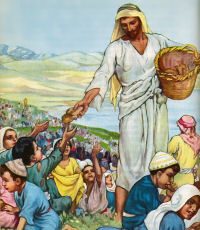Free eBook:

|
| Free eBook: Liturgical Year 2023-2024, Vol. 4 |
» Enjoy our Liturgical Seasons series of e-books!
"Now as for you, you have so many good things stored up for many years, rest, eat, drink, be merry!" But God said to him, "You fool, this night your life will be demanded of you; and the things you have prepared, to whom will they belong?" Thus will it be for all who store up treasure for themselves but are not rich in what matters to God.
Sunday Readings
The first reading is taken from the Book of Ecclesiastes 1:2; 2:22-23 and deals with the vanity of earthly things. It discusses the problem "What value has this earthly life for man?"
The second reading is from St. Paul to the Colossians 3:1-5, 9-11 in which he urges the converts to keep their eyes on Christ with whom they have been raised up to a new spiritual level or status. They must no longer be mixed up in the sinful things of this earth. They died to all this when they died with Christ in baptism.
The Gospel is from St. Luke 12:13-21. Jesus was surrounded by a large crowd to whom he was giving his message of salvation. Some men in the crowd asked him to arbitrate in a family dispute over property. This Jesus refused to do. This interest in property gave him the occasion to teach his hearers, and all of us, in a very effective parable, the relative value of this world's goods.
The lesson of this parable is obvious to all, and it is perhaps as difficult to put into practice as it is obvious. To be in this world and not of it, to collect the necessary goods of this world by honest labor and yet remain detached from them, to possess but not be possessed by worldly riches, is an ideal to which our weak human nature responds very reluctantly.
A large percentage of Christians, however, do respond to the challenge manfully and loyally. They earn and use the goods of this world, while at the same time they keep God's laws and earn wealth for heaven. Some renounce even the right, which is theirs, to possess the necessary things of this world, by taking on themselves the vows of religion. Thus they set themselves free to devote their whole time and energy to the service of God and neighbor. Others, and they are of necessity the more numerous, have to own the world's goods in order to provide for themselves and their dependants, but, while so doing, they never let their temporal possessions come between them and their God. To do this is not easy, but God's helping grace is always available to the willing heart.
There is still a third group—those who resemble the foolish man described in the parable. Like him they are so enmeshed and ensnared in their desire to collect good things for their earthly life, that they forget that at any moment they may have to leave this earth and all they possess in it. They may not have large barns or grain-bins bursting at the seams with the fruits of their fields or their market dealings, but they have allowed their possessions, large or small, to become the prison-houses of their hearts and thoughts. In their mad rush for earthly treasure they give themselves no time to stop and think of the really important thing in life, namely, that soon they must leave this world and all it holds dear to them. But it is not the departure from this world that is to be feared. Rather, it is the arrival at another for which they have made no preparation. That other world of which they have often heard, but which they shrugged off as something fit for the weak-minded, will not open before them in all its awe-inspiring immensity. They will have a momentary glimpse of the eternal beauty and happiness that they lost for a "mess of pottage," before they enter the unending valley of sorrow which they elected for themselves when, during their period of trial, they chose earthly baubles instead of God.
This has been the fate of foolish men and women in the past. It will, also, be the fate of many more in the future. It could be my fate, too, unless I remain ever on the alert to keep myself free from the snare of worldly wealth. I must remember that it is not the quantity of this world's goods which I possess that will be my undoing, but the quality of the hold which they have on me. There are and will be millionaires in heaven, while many in the lower income-brackets will find themselves excluded.
No man will be excluded from heaven because he lawfully possessed some of this world's wealth. But a man will exclude himself from eternal happiness if he lets this world's wealth possess him to the exclusion of God.
The fate of the rich man in the parable need not, and should not, be mine. I still have time to stop building larger grain-bins and barns, and to turn my attention instead to collecting some treasure for heaven.
— Excerpted from The Sunday Readings Cycle C, Fr. Kevin O' Sullivan, O.F.M.







